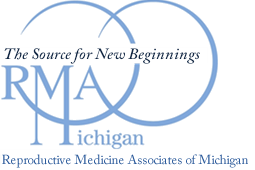Egg Donor Recipient Process
A Typical Cycle – Egg Production
The IVF cycle is performed on your donor using one or more fertility drugs to increase the number of eggs produced. Multiple follicles (the part of the ovary that contains the eggs) are needed to increase the number of eggs retrieved, thereby increasing the number of embryos developed and hence the chances for conception.
The process begins with the synchronization of both donor and recipient’s menstrual cycles and may require using the medication Lupron. Your donor will also be taking daily injections of Follistim or Gonal-f to encourage this multi-follicular development. Follicular maturation is evaluated by daily blood levels and ultrasound. At a time determined by the physician, an injection of Lupron is given to bring the eggs to final maturity. Approximately 36 hours after this injection, your donor will undergo the egg retrieval that is done in our OR on an outpatient basis.
Preparing Your Uterus For Implantation
You will be hormonally synchronized to your donor using Estrogen and Progesterone. Your endometrial receptivity will be evaluated similarly using blood tests and ultrasounds. In addition, the angle and depth of your cervix and uterus will be determined using a catheter identical to the one that will be used for the actual embryo transfer.
Egg Retrieval
Aspiration of follicles for eggs is performed through an ultrasound guided approach under IV sedation. The retrieval consists of aspirating the ovarian follicles and identifying the eggs in the follicular fluid under a microscope. The eggs are then held in an incubator until the time of insemination in the laboratory. On the same day your partner will be expected to produce a sperm sample that will be used to inseminate the eggs.
Embryo Transfer
The embryo transfer may be done 3-5 days after the retrieval. The physician performing the transfer will discuss with you and your partner the status of your embryos and the number to be replaced. At RMA of Michigan we choose to do elective single embryo transfers (ESETs) most of the time. However, the physician will review your embryo’s quality and quantity with you prior to transfer. You may be offered the opportunity to cryopreserve any remaining embryos that continue to develop normally, for possible transfer in future cycles.
You will come to the office for the transfer and the procedure will be done in the OR under sterile conditions, in a reclining position with legs up, as if having a pap smear. The transfer is easy and virtually pain free in most cases. Following the transfer you may return home to relax for the remainder of the day.
Testing for Pregnancy
Approximately 1 week after the retrieval date you will come back to the office to check your Progesterone level and one week after that for a pregnancy test. If you are pregnant we will follow your progress for an additional 4-5 weeks before discharging you to your own obstetrician.
